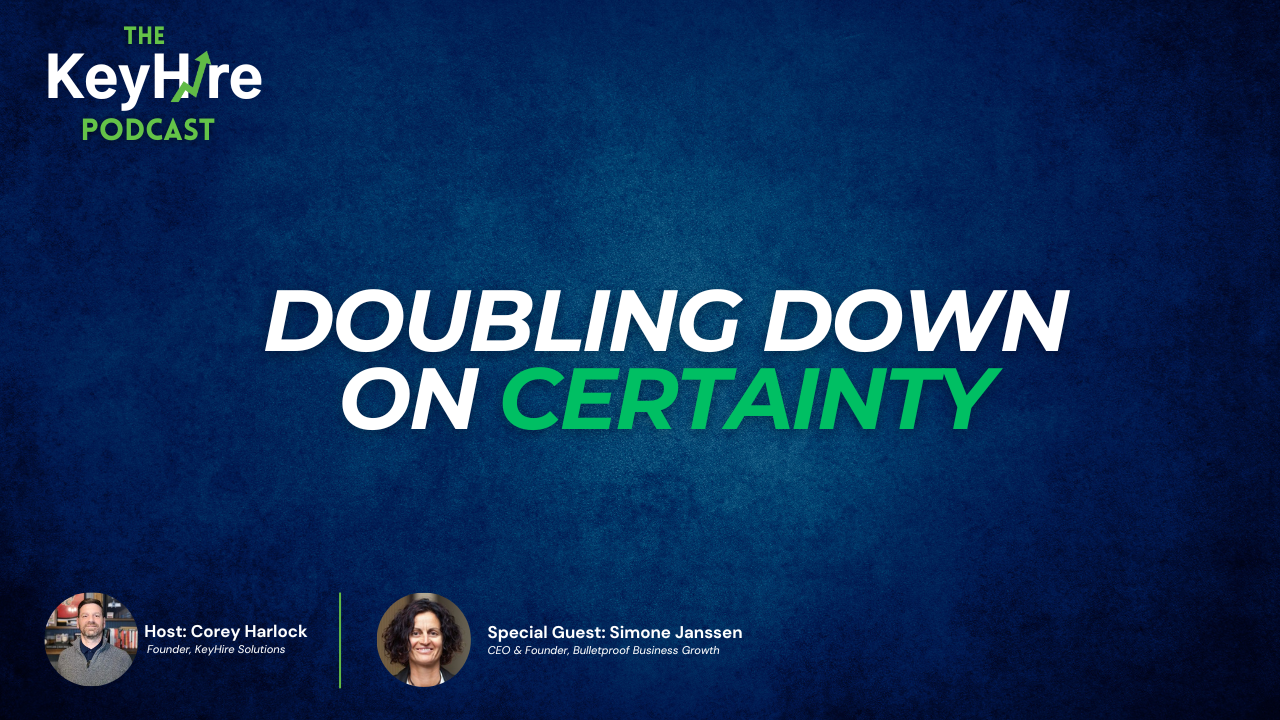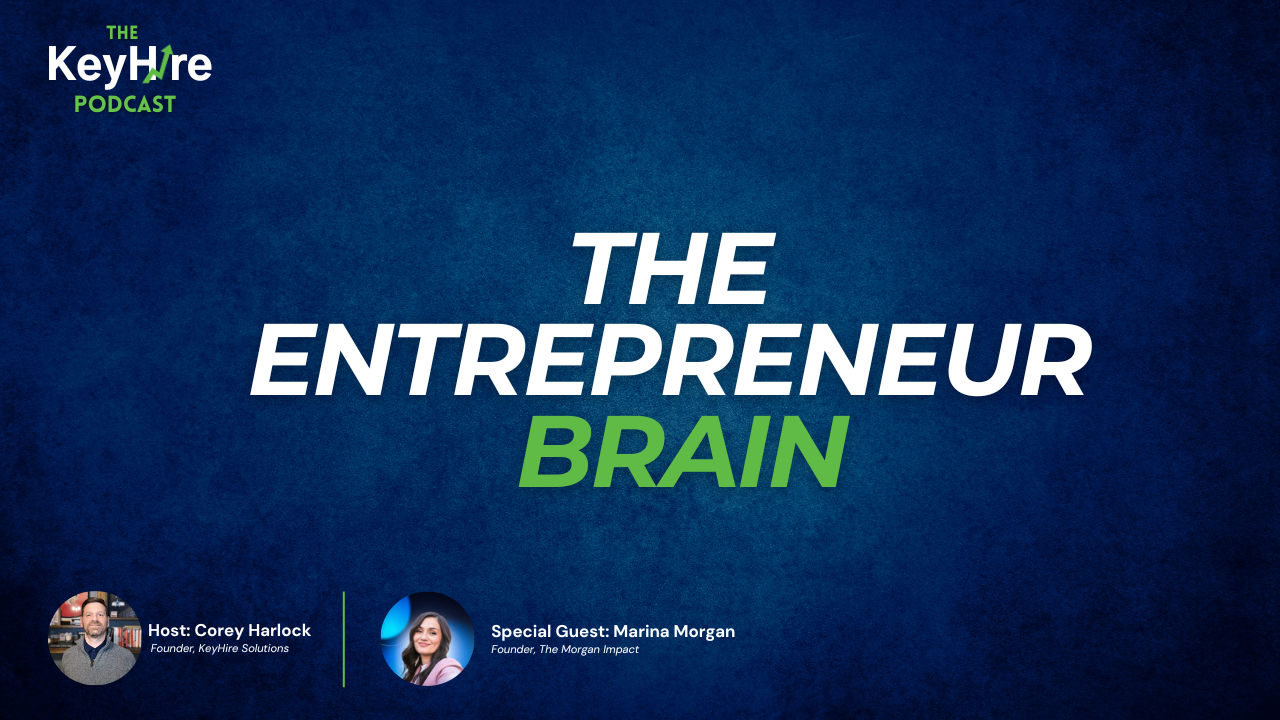Small Business Leadership Advice: Planning Your Exit Strategy While Building Your Team

As a small business owner, you're likely focused on the day-to-day challenges of running your company – hiring the right people, managing cash flow, and growing your customer base. But here's a question that might catch you off guard: What's your exit strategy?
In a recent episode of the KeyHire Small Business Podcast, host Corey Harlock sat down with Eric Grafstrom, CEO of The Exit Guide, to discuss how entrepreneurs can package their businesses for a successful exit. The conversation revealed critical insights that every business owner should consider.
The statistics are sobering: 85% of small businesses in the U.S. are owned by Gen X and Boomers, with most owners over 60-65. Whether you're planning to retire, pursue new ventures, or simply want to maximize your business value, understanding how to prepare for an exit is crucial for long-term success.
The Reality of Small Business Management and Exit Planning
Most entrepreneurs focus on business growth strategies, such as scaling operations, refining processes, and expanding market reach. Yet, seasoned business owners understand that building a successful company also involves planning its eventual exit, whether through sale, succession, or other means. The crucial point is that preparing for an exit goes beyond merely finding buyers; it involves strengthening your business fundamentals to add value now while positioning for future opportunities.
For companies with revenues between $5-25 million, preparation becomes even more vital. These small businesses are in a sweet spot: large enough to attract serious buyers but lacking the resources of bigger corporations. Here, strategic planning and smart management intersect to ensure readiness for exit. Consider the following key considerations for your business exit:
- Financial Documentation: Three years of P&L statements, two to three years of filed tax returns, and current balance sheets
- Legal Documentation: Lease agreements, employee contracts, and other critical business agreements
- Operational Systems: Documented processes that can function without your constant oversight
- Team Structure: A management team capable of maintaining operations during transition periods
Building a Scalable Business: The Foundation for Future Success
The principles of scaling a small business and preparing for an exit are remarkably similar. Both require systems, processes, and teams that can operate independently of the founder. This alignment means that focusing on scalability today sets you up for a successful exit tomorrow.
Eric emphasizes the importance of removing emotion from the equation: "Keep in mind, people are buying a business based on cash flow and other things. This is not an end of the market where people are buying opportunity." This perspective should influence how you build your team and structure your operations. Essential elements for building a scalable, exit-ready business include:
- Documented Processes: Every critical function should have clear procedures that any qualified person can follow
- Strong Management Team: Develop leaders who can make decisions and solve problems without constant input
- Diversified Revenue Streams: Reduce dependence on any single client, product, or service
- Clean Financial Records: Maintain accurate, up-to-date financial statements with professional oversight
- Compliance Systems: Ensure all legal, regulatory, and tax requirements are consistently met
The Strategic Entrepreneur's Mindset: Thinking Long-Term
Successful entrepreneurs recognize that each decision influences their future opportunities. This long-term perspective applies to hiring, operational improvements, and strategic planning. By focusing on the end goal from the start, you add value at every phase of your business journey. The talk with Eric highlighted the importance of a preparation timeline. He advises beginning formal preparations at least six months before launching your business. Nonetheless, foundational tasks such as establishing systems, developing teams, and keeping clean records should start well in advance.
The strategic entrepreneur's approach includes:
- Setting specific timeline goals for exit preparation
- Regular financial health assessments
- Continuous improvement of operational systems
- Strategic team development and succession planning
- Market positioning that demonstrates value to potential buyers
This mindset shift from "building a job for myself" to "building a valuable business asset" fundamentally changes how you approach growth challenges. It influences hiring decisions, investment priorities, and strategic planning in ways that benefit your business regardless of your ultimate exit timeline.
Avoiding Common Mistakes That Derail Exit Plans
The most successful business exits share common characteristics, just as the most problematic ones share predictable pitfalls. Understanding these mistakes can help you avoid them while building a stronger, more valuable business. Critical mistakes to avoid:
- Procrastination and Poor Planning: "No one wakes up on a Saturday morning and says, 'Well, I think I'm going to sell my house. Let's take a stick a sign in the front yard,'" Eric notes. The same principle applies to business sales.
- Emotional Attachment Over Financial Reality: Getting too personal about your business value can lead to unrealistic pricing and failed negotiations.
- Inadequate Financial Documentation: Errors in financial statements or missing documentation can kill deals during due diligence.
- Lack of Post-Exit Planning: "Have a plan for what you're going to do afterward," Eric emphasizes. "The brain doesn't know that you've sold the business... if that just drops off the table and isn't there anymore, you got to find something to replace it."
- Premature Market Testing: Discussing potential sales before you're prepared sends signals that you're not a serious seller.
- Overestimating Business Value: Using emotional rather than market-based valuations leads to unrealistic expectations and stalled negotiations.
The interconnection between these mistakes and daily business management is significant. Poor financial practices, inadequate systems, and emotional decision-making that hurt exit potential also limit current business performance and growth opportunities.
Taking Action: Your Next Steps
The insights from this podcast episode reveal that successful exit preparation isn't about following a rigid checklist – it's about building fundamental business strengths that create value regardless of your timeline.
Financial Foundation and Documentation: The cornerstone of any successful exit is maintaining clean, accurate financial records that effectively tell your business's story. This means working with qualified professionals to ensure your books are properly maintained, your tax returns are filed correctly, and your financial statements accurately reflect your business performance. Many business owners discover gaps in their documentation only when they're ready to sell, which can delay or derail potential deals.
Operational Independence and Systems Development: Building systems that function without your constant oversight serves dual purposes: it improves your current business operations while making your company more attractive to potential buyers. This involves documenting key processes, developing standard operating procedures, and creating workflows that any qualified person can follow. The goal is to transform your business from something that depends entirely on you into an operation that generates predictable results.
Team Development and Leadership Structure: Strong businesses have strong teams, and exit-ready businesses have teams capable of operating independently. This often requires strategic investments in leadership development, clear role definitions, and succession planning for key positions. KeyHire Solutions specializes in helping business owners build these capabilities through targeted human capital consulting and team development strategies.
Market Positioning and Value Assessment: Understanding your business's true market value requires objective analysis based on industry standards and comparable transactions. This involves looking beyond your emotional attachment to the business and focusing on the financial metrics that drive buyer interest. Regular business valuations can help you understand how your improvements affect overall value and identify areas that require attention.
Remember Eric's advice: "Set a date for which you will be ready to take this business to market." This creates focus and accountability around the preparation process, ensuring that exit readiness becomes an integral part of your business strategy rather than a last-minute scramble.
Key Takeaways
The path to a successful business exit begins with smart business-building practices implemented today. Whether you're planning to sell in two years or twenty, the fundamentals remain the same: build systems, develop people, maintain clean records, and think strategically about value creation.
Essential points to remember:
- Start preparing at least six months before you want to go to market, but build exit-ready foundations much earlier
- Focus on cash flow and documented systems rather than emotional attachment to your business
- Develop a strong management team that can operate independently
- Maintain professional financial records and legal documentation
- Plan for life after the business, not just the financial aspects of the sale
The intersection of effective small business management and exit planning isn't coincidental – they're two sides of the same coin. By building a business that could successfully operate without you, you create both immediate value and future opportunities.
At KeyHire Solutions, we help business owners develop the teams and systems that support both current growth and future exit success. The human capital investments you make today directly impact your business value tomorrow.
Whether you're ready to start planning your exit or simply want to build a more valuable business, the time to begin is now. Your future self – and your bank account – will thank you for the strategic decisions you make today.
Learn more about Eric: https://exitguide.com/
Check out our sponsor:
Career Spring, Careers launch here: https://careerspring.org/
Connect With Us:
KeyHire Solutions, Be Our Next Success Story: https://www.keyhire.solutions/testimonials
Contact Corey Harlock: corey@keyhire.solutions











